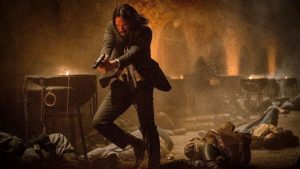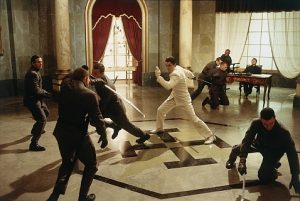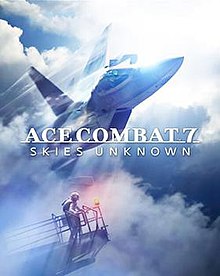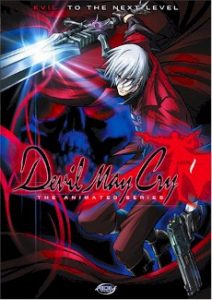Translating Power Fantasy Into Writing
The difficulty of translating power fantasy into writing, and talking about the entertainment of power in media.
 Power is something often talked about in action films. If you were to dive deep into why an action scene works, you might talk about the balance of power – how a fight might seesaw between hero and villain and heighten tension by constantly swapping out who has the upper hand. One might say a fight that is blow-by-blow, with one side having pretty much all the power, is boring. For the most part, I’d be inclined to agree. Watching or reading a scene in which the hero punches, then the villain, then the hero etc etc until one of them fell down sounds pretty boring. But what about when the protagonist, or villain, has all of the power all the way through? By the same token this should be pretty boring, unless contextually it is advancing a character plot, like a villain beating the hero at the start of the story only for the hero to run away and train.
Power is something often talked about in action films. If you were to dive deep into why an action scene works, you might talk about the balance of power – how a fight might seesaw between hero and villain and heighten tension by constantly swapping out who has the upper hand. One might say a fight that is blow-by-blow, with one side having pretty much all the power, is boring. For the most part, I’d be inclined to agree. Watching or reading a scene in which the hero punches, then the villain, then the hero etc etc until one of them fell down sounds pretty boring. But what about when the protagonist, or villain, has all of the power all the way through? By the same token this should be pretty boring, unless contextually it is advancing a character plot, like a villain beating the hero at the start of the story only for the hero to run away and train.
But I don’t think it is, not if done correctly. Movies like John Wick, Commando, and Equilibrium all feature heroes that, in multiple action scenes, tear their way through hordes of enemies without so much as flinching. Ignoring the context of the story, the action by itself is entertaining to watch. Why? We likely know the hero is not in real danger, a random mob isn’t going to shoot them halfway through the film in the middle of a scene, we’d find that disappointing. Power fantasy. It’s something that we talk a lot about in interactive media, the idea of empowering the player and making them feel good – but I feel it’s often overlooked in films.
 We enjoy watching the hero overpower enemies because their skill and prowess is a spectacle that is endlessly entertaining to watch. The few fights in John Wick in which he is equally matched, at least for me, are less entertaining because they don’t give that same power fantasy – now you’re just watching a fight that without the context of the story is simply a very well-done fight. Equilibrium does not focus on its action nearly as much, but of the four real fights in the movie (not including the intro scene) three are just Christian Bale tearing his way through guards like a hot knife through butter. Still, it is entertaining because look at those mooooves!
We enjoy watching the hero overpower enemies because their skill and prowess is a spectacle that is endlessly entertaining to watch. The few fights in John Wick in which he is equally matched, at least for me, are less entertaining because they don’t give that same power fantasy – now you’re just watching a fight that without the context of the story is simply a very well-done fight. Equilibrium does not focus on its action nearly as much, but of the four real fights in the movie (not including the intro scene) three are just Christian Bale tearing his way through guards like a hot knife through butter. Still, it is entertaining because look at those mooooves!
Spectacle is often discounted because it is shallow and an easy way to make an action scene look better than it actually is – but I think it depends what kind of spectacle we’re talking about. It is true that a fight that advances the plot, makes us understand more about characters and has a tangible reason to exist is far better ‘writing;’ but I would not argue that it is more entertaining. Michael Bay’s Transformers movies have a lot of spectacle, explosions, fire, tanks and jets – but they’re far less entertaining than someone who has trained for months to make those specific scenes, every single little movement entertaining in one way or another. The upcoming Top Gun remake (I hope) is like this, with Tom Cruise at the helm of the Jet along with many other fighter pilots actually flying the actors around – meaning the spectacle will be something to behold. Whilst I love fights that are driven by emotion and a crescendo to existing conflict e.g The Matrix Revolutions, Cowboy Bepop, they are not the only way of making an entertaining fight scene (though they do have the spectacle to back them up too.)
 With games it is a little easier. They do not have the same criteria for an ‘action’ scene as the game themselves are the reason. Why are there demons all over this facility? So that I have something to shoot. It’s easier to suspend your disbelief when you’re involved. Halo makes you feel powerful through strategy and mind games with opponents, both online and in the single player, and by making the marines around you shout about how amazing the chief is. Ace Combat 7 is amazing at making you feel powerful – it has characters that sit back in awe of you as you single-handedly wipe out a squadron of drones or take on ‘Mister X’ – the best pilot anyone has ever seen. Power fantasy is a core concept of games because it is fun to feel powerful. Some games even use dis-empowerment to make you feel empowered at the end of the game all at once. Beating the Resident Evil 2 remake for the first time felt absolutely incredible, but right up until the end of the game, I was never handed more than precisely what I need to just barely scrape through.
With games it is a little easier. They do not have the same criteria for an ‘action’ scene as the game themselves are the reason. Why are there demons all over this facility? So that I have something to shoot. It’s easier to suspend your disbelief when you’re involved. Halo makes you feel powerful through strategy and mind games with opponents, both online and in the single player, and by making the marines around you shout about how amazing the chief is. Ace Combat 7 is amazing at making you feel powerful – it has characters that sit back in awe of you as you single-handedly wipe out a squadron of drones or take on ‘Mister X’ – the best pilot anyone has ever seen. Power fantasy is a core concept of games because it is fun to feel powerful. Some games even use dis-empowerment to make you feel empowered at the end of the game all at once. Beating the Resident Evil 2 remake for the first time felt absolutely incredible, but right up until the end of the game, I was never handed more than precisely what I need to just barely scrape through.
So, you’re saying: “that’s all great, but what does it have to do with translating that into writing and it’s ‘difficulty’?”
I don’t know how to write a power fantasy. I’ve been thinking about it for weeks now – how do you translate the feeling of watching a John Woo or John Wick movie into a book? How do you transcribe the feeling of tearing through hordes in Doom, or outplaying the enemy in Halo? How do you make the reader feel powerful? Writing about a character that slices through hordes of enemies with slick moves is fun to write and think about, but it just makes the reader think ‘hey, that character is cool!’. It doesn’t make the reader themselves feel powerful. The closest I can think to a common power fantasy in writing is in detective, mystery and crime fiction – where figuring out the answer before it’s given to you is an exhilarating feeling. But you cannot transport the reader into the fantasy the same as you can in visual mediums – half the fantasy is the spectacle.
 Let’s use Devil May Cry as an example to talk about writing power. A main staple of Dante’s character is that he is frankly overpowered, and rightly cocky because of that. It is very rare in the series that Dante is matched in any way, only a select few bosses and characters could be considered anywhere close to his power level. Playing as him, and playing well, is simply fulfilling that power fantasy. If you play well, the cut-scenes with Dante being cocky and playful feels the same as in the game when you taunt enemies only to dodge every one of their attacks before toying with them to get the highest score possible. Devil May Cry also had an anime adaptation – that focused on the stories of other characters to make Dante showing up be an exciting moment, hyping the audience up for a super cool fight full of spectacle and goofiness. How would you write that in a way that incorporates the reader/viewer/player’s own feeling of power? Sure you can write moments that may make your reader ecstatic – a hero turning up and single-handedly turning the tide of a battle – or a fleet arriving just in time to save your characters from certain annihilation – but that’s more of a relief and cool moment that making the reader themselves feel powerful.
Let’s use Devil May Cry as an example to talk about writing power. A main staple of Dante’s character is that he is frankly overpowered, and rightly cocky because of that. It is very rare in the series that Dante is matched in any way, only a select few bosses and characters could be considered anywhere close to his power level. Playing as him, and playing well, is simply fulfilling that power fantasy. If you play well, the cut-scenes with Dante being cocky and playful feels the same as in the game when you taunt enemies only to dodge every one of their attacks before toying with them to get the highest score possible. Devil May Cry also had an anime adaptation – that focused on the stories of other characters to make Dante showing up be an exciting moment, hyping the audience up for a super cool fight full of spectacle and goofiness. How would you write that in a way that incorporates the reader/viewer/player’s own feeling of power? Sure you can write moments that may make your reader ecstatic – a hero turning up and single-handedly turning the tide of a battle – or a fleet arriving just in time to save your characters from certain annihilation – but that’s more of a relief and cool moment that making the reader themselves feel powerful.
I have not found a book that is anything like John Wick, Doom or One Punch Man – where the focus of the narrative is an overpowered character that is just straight up fun to watch/embody. A key element of this power fantasy in both Doom and John Wick is defiance. Defiance against a higher power that you love to hate, and so love to watch being beaten by the hero. As such, perhaps the easiest way to incorporate this kind of power into the narrative would be to heavily lean on this angle, and focus on the catharsis of watching something you hate being defeated. The boogeyman’s boogeyman is always an interesting concept and plays very much into this idea of a power fantasy.
I don’t really have a conclusion that ties all of this together, if any of you who reads this would like to disprove me with some amazing power fantasy books than be my guest – but I feel it is a difficult idea to translate to the writing medium – and writing this out has given me some ideas on how to attempt it. If you’re a writer, I challenge you to give it a go too!

[…] Translating Power Fantasy Into Writing […]
Jack Reacher.
I have never thought of a book and film in that way but you are right
Really interesting read well done